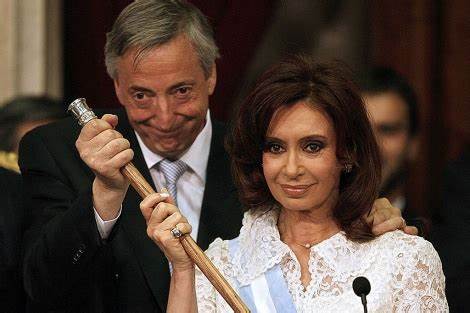Talk about a power couple! Bill, Hillary, please take note. In an effort to understand the cultural perspective of current Argentine politics, it’s necessary to understand what led up to this point. I’ll lay out the facts so you can discuss politics like a true local over an Asado and a glass of Malbec.
Néstor Carlos Kirchner was President of Argentina from 2003 to 2007, and his wife, Cristina Fernández de Kirchner, followed in his footsteps from 2007 to 2015.
Néstor Carlos Kirchner: From Mayor to President of Argentina
The Justicialist Party was Néstor Kirchner’s political party, based on Peronism. This political ideology is a mix of socialism, left-wing nationalism, and radicalism that rejects both capitalism and communism. Justicialism tries to appeal to all social classes, but it leans towards the left-wing.
During Néstor Kirchner’s presidency, Argentina’s soy production helped boost the country’s growth by 9% annually. The minimum wage rose by 1,300% between 2003 and 2013, and Kirchner overthrew the “Laws of Pardon” that had protected Argentinians who had committed genocide from 1976 to 1983. The infrastructure and housing improvements during this period were due to the growth in public investment. However, some argue that Argentina’s economic default in 2001 made it easier for Kirchner to look good.
Kirchner had his share of controversies. While serving as governor of Santa Cruz, he would switch between right and left-wing to avoid long-term policies, and he stopped many investigations into corruption. His insular import/export policies helped domestic markets but stung farmers who were instrumental in bringing Argentina out of its financial crisis through things like soy production. Néstor Kirchner stepped down, but his influence remained, leading many Argentinians to think that Cristina was just a puppet.
Cristina Fernández de Kirchner is a Peronist, and her political ideology is based on social justice, economic independence, and political domination. Her presidency saw the nationalization of Argentinian airline Aerolineas Argentinas, as well as the passing of same-sex marriage and gender identity laws. Unemployment fell to 6.9%, and the national poverty rate was 6.5%, which are good numbers.
However, Cristina’s government was accused of being involved in the 1994 Jewish Center Bombing in Buenos Aires. She was accused of letting the bombers escape prosecution for a sweet deal for oil with Iran. Alberto Nisman, who led the investigation against Cristina and the bombing, was found dead in his home with evidence of foul play. In 2016, Cristina faced charges of treason and staging a cover-up of the Iranian involvement in the 1994 bombing. Her strict currency controls led to the black market rocketing.
The Kirchners’ political careers were marred by scandals and accusations of corruption, but they also yanked Argentina out of a crippling financial crisis, empowered the gay and trans community before any other South American country, and brought justice to those involved in the country’s genocide. Corruption was the biggest stain on the Kirchner government, but what South American government hasn’t been corrupt? The Kirchners embezzled money and corrupted legal proceedings, but they also brought positive changes to Argentina.
Kirchners’ timeline in politics:
- 1987: Néstor Carlos Kirchner is elected mayor of Río Gallegos, the capital of Santa Cruz Province in southern Argentina. He serves in this position until 1991.
- 1991: Néstor Kirchner is elected governor of Santa Cruz Province. He serves two terms, from 1991 to 2003.
- 2003: Néstor Kirchner is elected President of Argentina, defeating his opponent Carlos Menem. Kirchner’s presidency is marked by efforts to strengthen democratic institutions, expand social programs, and boost economic growth. He also takes steps to address human rights abuses committed during Argentina’s military dictatorship (1976-1983).
- 2007: Cristina Fernández de Kirchner, Néstor Kirchner’s wife, is elected President of Argentina. She becomes the first woman to hold the office. During her presidency, she implements policies aimed at reducing poverty, expanding access to healthcare and education, and strengthening the country’s social safety net. Her presidency is also marked by tensions with the media and the judiciary.
- 2011: Cristina Fernández de Kirchner is re-elected President of Argentina, with 54% of the vote. Her second term is marked by increasing economic difficulties, including high inflation and a shortage of foreign currency.
- 2015: Mauricio Macri, a center-right politician, is elected President of Argentina, defeating Cristina Fernández de Kirchner’s chosen successor, Daniel Scioli. Macri’s victory marks the end of the Kirchners’ 12-year rule.
- 2019: Alberto Fernández, who was Chief of Staff to Néstor Kirchner during his presidency, is elected President of Argentina. Fernández campaigns on a platform of economic reform and social justice, promising to address income inequality and boost economic growth. Cristina Fernández de Kirchner is elected Vice President, marking her return to the executive branch after serving as a senator.
- 2021: The Fernández administration faces a range of challenges, including a worsening economic crisis, a surge in COVID-19 cases, and political unrest. Cristina Fernández de Kirchner’s influence in the government is a subject of debate, with some accusing her of wielding undue influence over policy decisions.
Looking to learn Spanish? We can help you!




